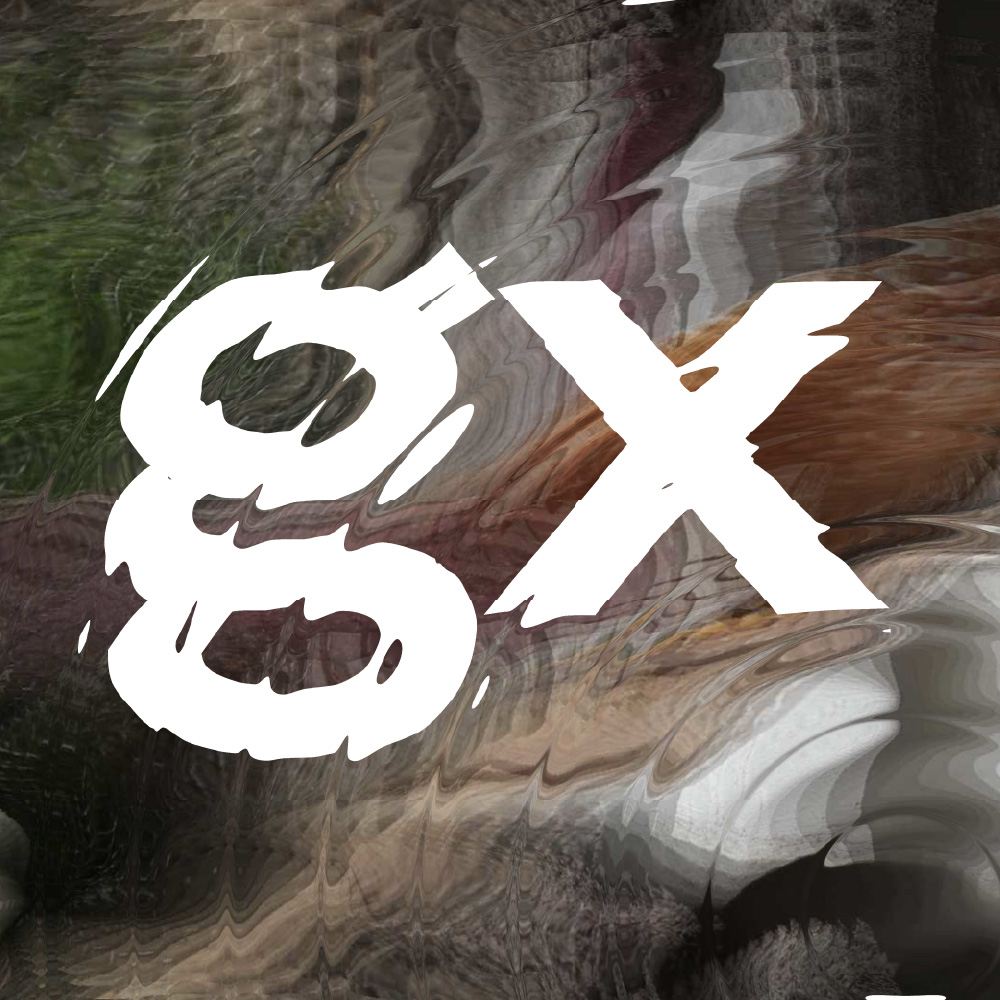June 24th – August 2nd 2024
Level: beginner
Max participants: 16
Maximize your creativity
Dive into Max!
Explore the limitless possibilities of generative music production using the dynamic duo of Max and Max-for-Live! This course is designed for artists, musicians, producers, and sound enthusiasts looking to push the boundaries of creativity and harness the potential of generative musical techniques in their art.
Max/MSP, a visual programming language, provides an unparalleled platform for creating not only custom audio and MIDI effects and compositional tools but also sound in interdisciplinary contexts. Max-for-Live offers a dynamic environment for integrating these tools directly into your Ableton Live workflow, featuring a number of custom objects for the Live environment.
This course teaches you the main industry specializations in one intensive education:
From algorithmic composition to real-time interactive public performances, this course will allow you to create music that evolves and adapts organically, breaking away from traditional compositional constraints.
You will learn:
- Generative music production
- Max/MSP visual programming
- Max for Live
- Synthesis and sequencing
- Psychoacoustics, analytic and artificial listening
- Web audio with RNBO devices
- Machine learning and AI using
- Flucoma for audio signals and musical symbols
By the end of the program, you will have the skills to sculpt ever-changing non-linear soundscapes, transforming and upgrading your approach to music production and performance, which will culminate in the final presentations and live acts at Berlin’s renowned venue Acud Macht Neu Club.
900€ Early bird registration (till May 26th)
on-location & online
Veteranenstrasse 21
10119 Berlin
All of our teachers are Berlin-based leading experts with years of experience in their practical field, who will give you a deep insight into their craft, technique, and artistic visions.
Regular classes:
Olivier Pasquet
Tamas Marquetant
Masterclasses:
James Bradbury
John MacCallum
Nenad Popov (nesa)
Annette Krebs
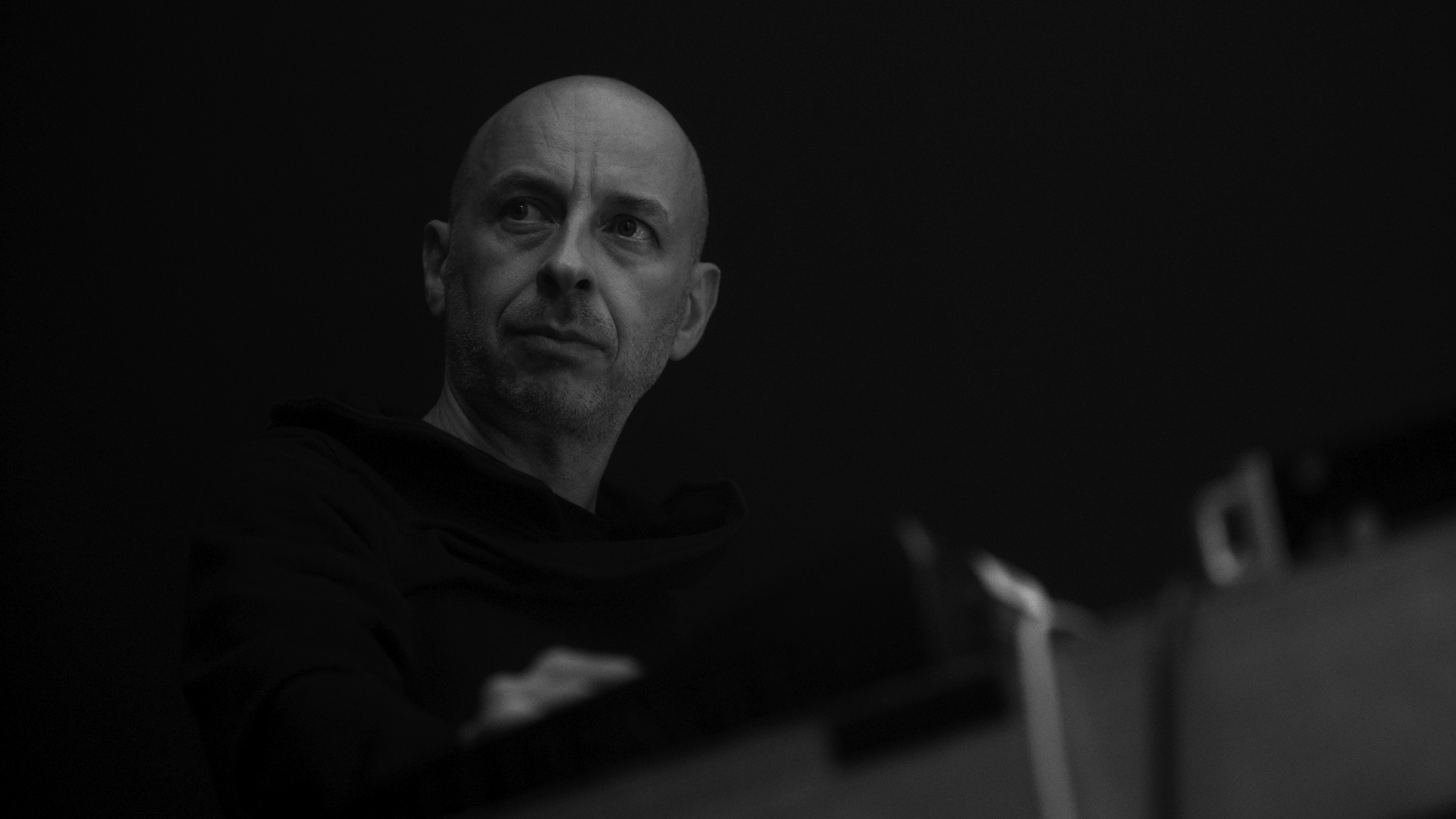
Olivier Pasquet
Olivier Pasquet is a composer, music producer, and visual artist. His generative pieces are spatialised and contextualized within rationalist theory-fiction. His work is performed or showcased worldwide at various festivals, museums, and often site-specific venues. In recent times, he has been crafting highly rhythmic and spatialized AI compositions, intertwining voice with architectural elements that are interesting acoustically, visually, and socially.
After completing his composition studies in Cambridge, he worked in several popular music studios and spent a short period at INA-GRM. He obtained his Ph.D. in musical composition and non-standard architecture from Huddersfield University. He has collaborated with a wide variety of artists, primarily at IRCAM-Centre Pompidou for decades. Additionally, he was an artistic researcher at Tokyo University, Keio University, Buffalo University and lately Institute for Computer Music at Zurich University of the Arts. Pasquet has worked as a consultant at Sony CSL, Ableton, and contributed to the artistic machine-learning European Flucoma research project. Currently, he serves as a professor in computational arts at Goldsmiths, University of London.
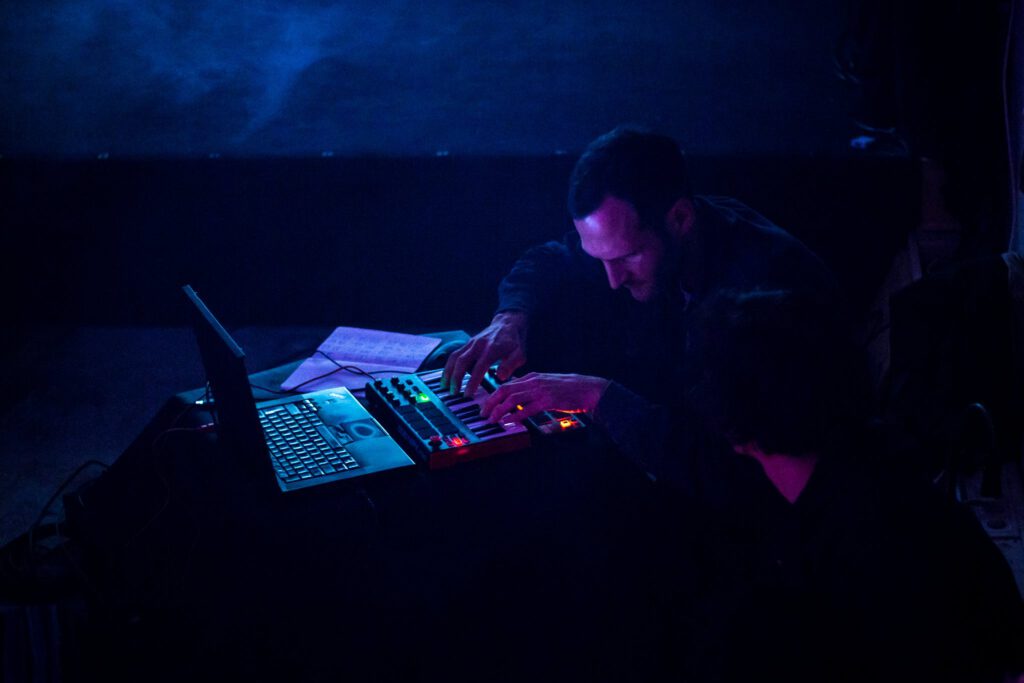
Tamas Marquetant
Tamas Marquetant is a sound artist, musician, performer based in Berlin. Besides working on solo music and audio-visual projects, he is also a lecturer of sound art/sound design for visual media at Catalyst Institute for Creative Arts, Berlin. He was a co-founder of Rites Network, a collaborative network of visual and sound artists in Budapest.
https://www.burgoismagnetic.com
CLASS 1 Monday June 24th
6 pm – 9 pm
Instructor: Tamas Marquetant
Introduction
— Introduction to the course
— Aesthetics of Max based artworks
— Signal flow and types, introduction to MIDI
— Create your first Max For Live sequencer
CLASS 2 Wednesday, June 26th
6 pm – 9 pm
Instructor: Tamas Marquetant
Sequencing
— Lists, variables, wireless connections
— Signal Networks, Synthesis
— Extended Sequencing: introduction to audio sequencing with Max 8.3 objects
CLASS 3 Friday June 28th
6 pm – 9 pm
Instructor: Tamas Marquetant
Non-Linearity and FX
— Envelopes, Delay lines, and FX
— Random processes – part 1
— Markovian sequencing – part 1
— Feedback, feedforward – part 1
— Create a Generative Random Delay line – part 1
CLASS 4 Monday July 1st
6 pm – 9 pm
Instructor: Olivier Pasquet
Anamdro (Random)
— Installing and using libraries (package manager)
— Ease functions (musical gestures)
— Random processes – part 2 (random processes)
— Feedback, feedforward – part 2 (fractals and chaos music)
CLASS 5 Wednesday July 3rd
6 pm – 9 pm
Instructor: Olivier Pasquet
Artificial nature
— Buffers, sampling sample, playback and looping
— Distortion (waveshaping)
— Simple physical models (waveguides, modal synthesis)
— Mixing and mastering (compression, EQ in Max)
CLASS 6 Thursday July 4th
6 pm – 9 pm
Instructor: Olivier Pasquet
Time and space
— Emergence and synchronicity (moiré, polyrhythms, perception)
— Times and synchronisation (tricks for playing with other musicians, automatic score followers, triggering events)
— Sound spatialisation (panning, WFS, HOA, binaural)
CLASS 7 Monday July 8th
6 pm – 9 pm
Instructor: Tamas Marquetant
Generative approach and polyphony
— Creative approaches with mc (multi-channel)
— Create a Generative Random Delay line – part 2
— FM synthesis
— Connecting Max with other softwares and between computers (OSC)
CLASS 8 Wednesday July 10th
6 pm – 9 pm
Instructor: Tamas Marquetant
— Additive, and granular
— Controllers and sensors
— Create a Generative Random Delay line – part 3
Masterclass 1 Saturday July 13th
12 pm – 3 pm
Instructor: James Bradbury
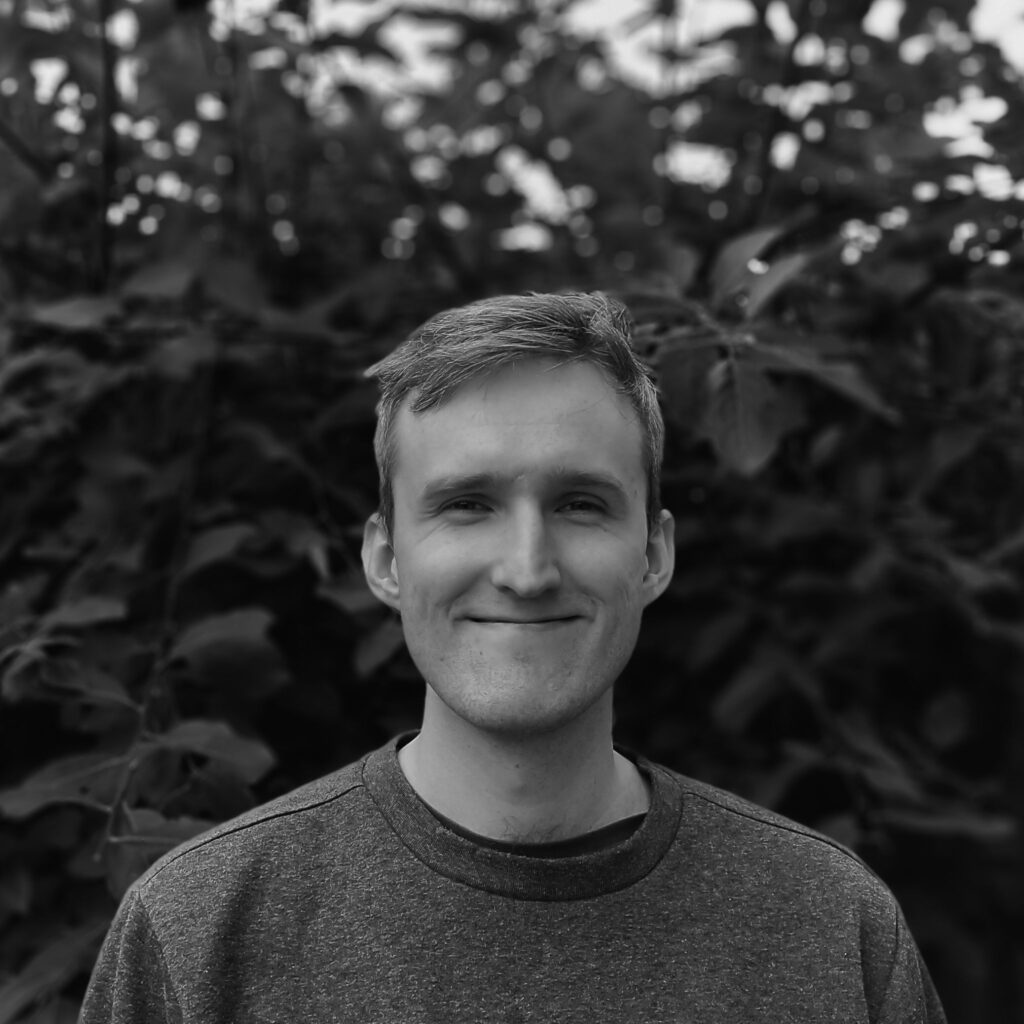
James Bradbury is a creative-coder and artist from Perth, Western Australia currently living in Berlin. He enjoys programming in his practice often harnessing the computer to find and organise audio-samples through machine listening and learning. He used to work as a Research Fellow in Creative Coding on the Fluid Corpus Manipulation project, and now works as a User Researcher on the Max for Live team at Ableton. Currently he is working on projects with Mark Fell and Rian Treanor at https://intersymmetric.xyz. Most recently he released “Extension” on SUPERPANG. Listen to it here: https://jamesbradbury.net/projects/extension/.
In this workshop / masterclass, we will take the opportunity to experiment with emerging technologies in Max, using my practice as a point of departure. We will cover a range of topics including RNBO and deployment of RNBO patches to the web, as well as using the Fluid Corpus Manipulation toolkit for creative exploration.
RNBO lets you export the work you do in Max. The goal with RNBO is to give you the best of Max—rapid iteration, creative exploration—with the freedom to take the resulting work and use it outside of Max. Without writing any code, you could export an audio plugin that will run in another Digital Audio Workstation or run your RNBO patch on a Raspberry Pi. You can also export to C++ or Web Assembly code for your desktop, mobile, or web applications.
FluCoMa is a toolkit for making music with machine listening and machine learning within Max, SuperCollider, & Pure Data. The toolkit offers audio decomposition tools to separate real-time and recorded audio into component elements, audio analysis tools to describe audio components as analytical and statistical representations, data analysis and machine learning algorithms for pattern detection and expressive corpus browsing, and audio morphing and hybridization algorithms for audio remixing, interpolating, and variation-making.
By the end of the workshop I hope that you have the necessary foundation to explore for yourself these rich topics which have interested me creatively for some years.
CLASS 9 Thursday July 18th
6 pm – 9 pm
Instructor: Olivier Pasquet
Connections
— Max4Live development (exploration of new Max4Live devices)
— Max4Live API (hacking Max4Live devices and controlling Live from Max)
CLASS 10 Thursday July 25th
6 pm – 9 pm
Instructor: Olivier Pasquet
Hearing, listening
— Psychoacoustics and analytic listening of music (exercice)
— Artificial listening (pitch tracker, sound descriptors and clustering)
— Machine learning for audio signals and for musical symbols
Masterclass 2 Saturday July 20th
2 pm – 5 pm
Instructor: John MacCallum
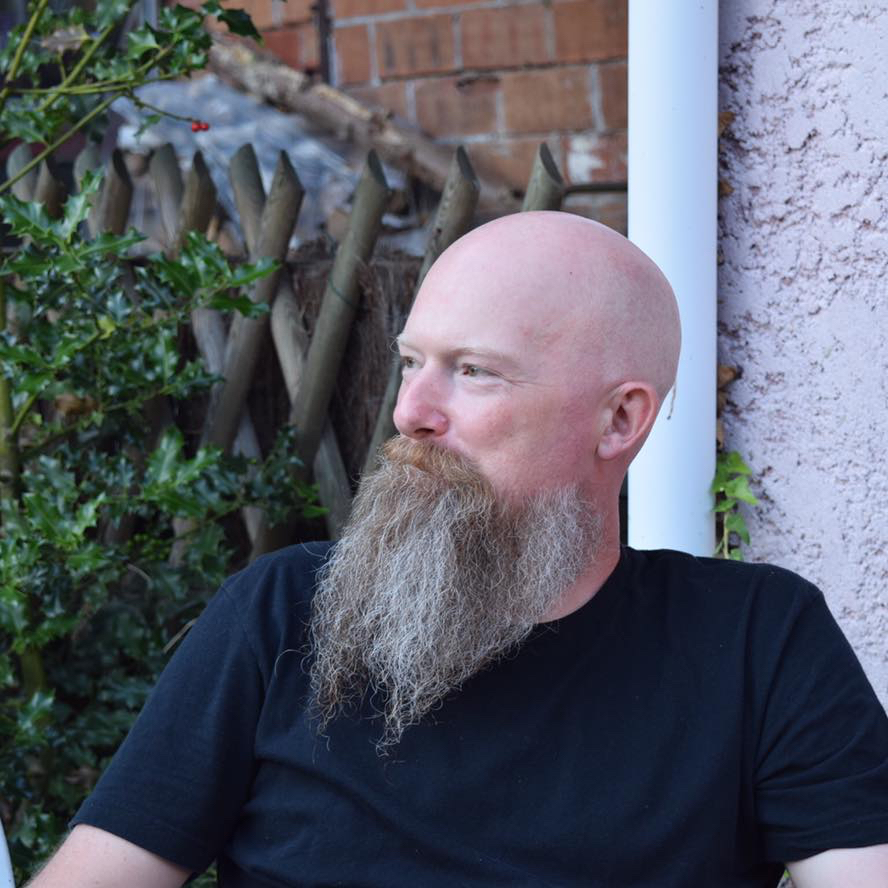
John MacCallum is a media artist, performer, and software engineer based in Berlin. Originally from California, his training is in music composition and computer science. His work for the past decade has been in collaboration with choreographer and media artist Teoma Naccarato, and has been focused on extended-durational performances that take place inside of high-channel-count realtime audio/visual systems that put philosophical pressure on notions of representation, boundaries, and binaries. He currently works as a software consultant for Cycling ’74.
We will look at strategies for the realtime use of biosignals for generative music. In addition to the acquisition, processing, and manipulation of such signals, we will discuss their sonic and temporal characteristics and methods to exploit them.
Masterclass 3 / Workshop Monday July 22nd & Wednesday July 24th
6 pm – 9 pm
Instructor: Nenad Popov (nesa)
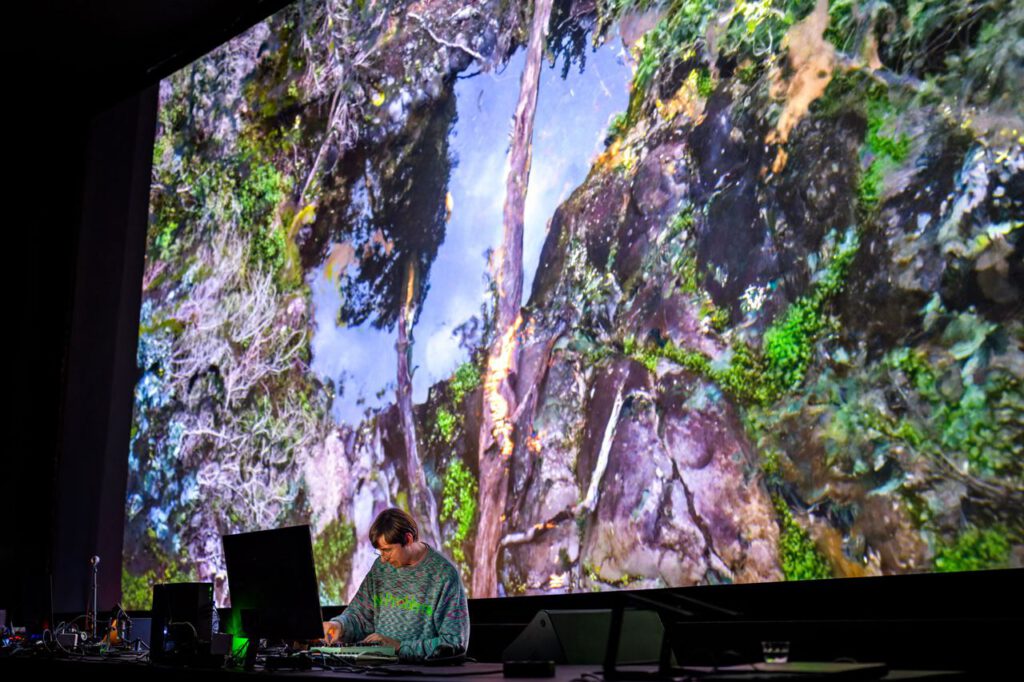
ph: Pieter Kers
Nenad Popov (nesa) is an interdisciplinary artist based in Berlin. His work consists of live audiovisual performances, installations and workshops. He is also a software developer focusing mostly on max/msp and c++. www.morphogenesis.eu
Realtime AI sound generation in Max
Workshop focused on the use of realtime neural audio synthesis objects in Max. During the workshop students will learn how to train and use the model to create new sounds or transform existing ones (similar to style transfer for images). To learn the training methods, students will learn how to prepare the sound material for the training, as well as how to setup and supervise the training locally or in the cloud. For the sound synthesis, students will learn how to compose the inputs to the model directly and how to tweak the data flow in the style transfer mode.
Masterclass 4 Saturday July 27th
12 pm – 3 pm
Instructor: Annette Krebs
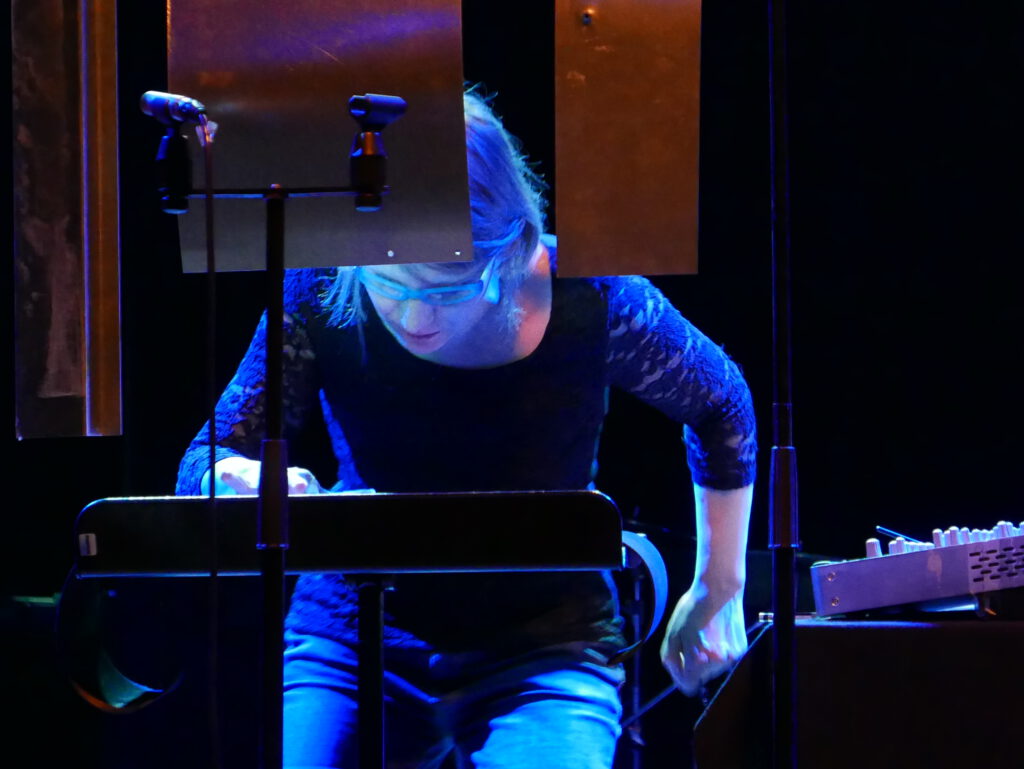
Annette Krebs works at the interface of electroacoustic composition, improvisation, and sound research. Within her projects and collaborations, she explores new approaches to electroacoustic music and sound in connection with field recordings, instrumental music, video and performance.
She has lived and worked in Berlin since 1993 and has been one of the pioneers of Echtzeitmusik around the year 2000. After gradually deconstructing her instrument, the guitar, she began developing live compositions for mixing consoles, computers, objects and several loudspeakers in 2005. Since 2013, she has been developing the series Konstruktion#: pieces of metal, glass, paper, foil, strings and other materials are played instrumentally and amplified via microphones. Their sounds are controlled, processed and mixed live in the computer using tablets and sensors.
Annette performs at concerts and festivals worldwide, e.g.: Akademie der Künste, Heroines Of Sound Festival, Kontakte Festival (Berlin), Donaueschinger Musiktage, EMS Elektronmusik Studion(Stockholm), TonalÁtonal (Mexico City), Serralves em Festa(Porto), Sonic Arts Research Centre (Belfast), NOTAM (Oslo), Audio Foundation(Auckland), Mona Foma Festival (Tasmania), Festival Internacional de Arte Sonoro Monteaudio (Montevidéo), Conservatoire De Rennes, Namless Sound (Houston), SAIC-School of the Chicago Art Institute, Universidad de Los Andes (Bogotá), Janáček Academy of Music (Brno)
Her music has been funded by numerous grants, e.g.: Senatsverwaltung für Kultur und Europa, Berlin; Goethe-Institut; Cité Internationale des Arts Paris; Akademie der Künste, Berlin; EMS Elektronmusik Studion, Stockholm and presented on the radio and in the press, including Positionen-Texte zur aktuellen Musik, Deutschlandradio Kultur, WDR-3, BR Klassik, His Voice (CZ), The Wire- adventures in sound and music (UK).
www.annettekrebs.eu
CLASS 11 Monday July 29th
6 pm – 9 pm
Instructors: Olivier Pasquet and Tamas Marquetant
Conclusions and final consultations
Final Presentations & Live Acts @ACUD CLUB
Thursday August 1st & Friday August 2nd
___________________
This six-week journey promises to redefine your approach to music production and performance. Don’t miss your chance to unleash your sonic potential – enroll now and let your creativity soar!
LATE BIRD REGISTRATION BY JUNE 19!
For online participation and other questions contact: bojana@berlinschoolofsound.com
Bookings
Bookings are closed for this event.
What else is going on What else is going on What else is going on
- Course
- Workshop

